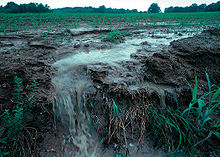- Nutrient pollution
-
Nutrient pollution, a form of water pollution, refers to contamination by excessive inputs of nutrient. It is a primary cause of eutrophication of surface waters, in which excess nutrients, usually nitrogen or phosphorus, stimulate algal growth. Sources of nutrient pollution include runoff from farm fields and pastures, discharges from septic tanks and feedlots, and emissions from combustion.
See also
References
 This article incorporates public domain material from the Congressional Research Service document "Report for Congress: Agriculture: A Glossary of Terms, Programs, and Laws, 2005 Edition" by Jasper Womach.
This article incorporates public domain material from the Congressional Research Service document "Report for Congress: Agriculture: A Glossary of Terms, Programs, and Laws, 2005 Edition" by Jasper Womach.
- U.S. Environmental Protection Agency (EPA). Washington, DC. "Protecting Water Quality from Agricultural Runoff." March 2005. Document No. EPA 841-F-05-001.
External Links
- Environmental Impacts and Benefits of Manure focuses on phosphorus and water quality. Part of the manure nutrient management section of the Livestock and Poultry Environmental Learning Center.
Categories:- Agricultural soil science
- Sustainable agriculture
- Fertilizers
- Organic gardening
- Environmental soil science
- Water pollution
Wikimedia Foundation. 2010.

